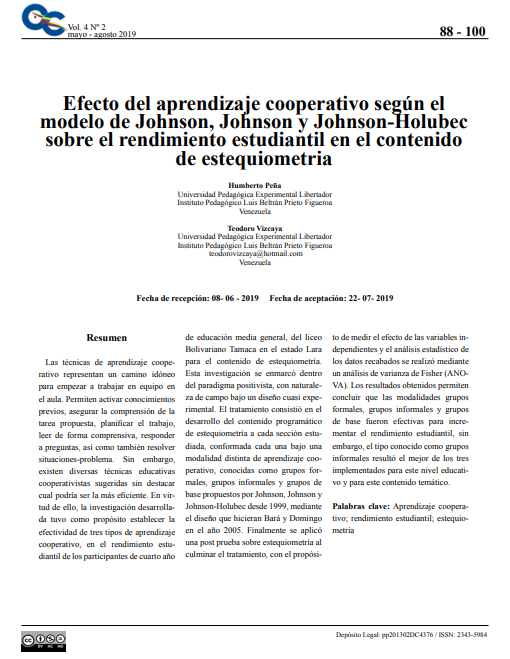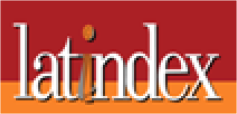Effect of cooperative learning according to the Johnson, Johnson and Johnson-Holubec model on student performance in stoichiometry content
Keywords:
Aprendizaje cooperativo, rendimiento estudiantil, estequiometríaAbstract
The cooperative learning techniques represent an ideal way to start working as a team in the classroom. They allow to activate previous knowledge, to assure the understanding of the proposed task, plan the work, read comprehensively, answer questions as well as to solve problem situations. However, there are various cooperative educational techniques suggested without highlighting which could be the most efficient. By virtue of this, the research developed had the purpose of establishing the effectiveness of three types of cooperative learning, in the student performance of the fourth year students of general media education, from Tamaca Bolivarian High School in Lara state for stoichiometry content. This research was framed within the positivist paradigm, with a field nature under a quasi-experimental design. The treatment consisted in the development of the programmatic content of stoichiometry to each studied section, each one conformed under a different modality of cooperative learning, known as formal groups, informal groups and base groups proposed by Johnson, Johnson and Johnson-Holubec since 1999, through the design that Bará and Domingo did in 2005. Finally, a post test was applied on stoichiometry at the end of the treatment, with the purpose of measuring the effect of the independent variables and the statistical analysis of the data collected was carried out through an analysis of Fisher variance (ANOVA). The results obtained allow to conclude that the modalities Formal Groups, Informal Groups and Base Groups were effective to increase the student performance, however the type known as Informal Groups was the best of the three implemented for this educational level and for this thematic content.
Downloads
References
Aguilar, S. (2008). El aprendizaje cooperativo: una forma de favorecer la inclusión. Trabajo de grado Disponible: http://zaguan.unizar.es/record/18106/files/TAZ-TFG- 2014-2913.pdf. [Consulta: 2018, Agosto 03].
Arias, F. (2012). El Proyecto de Investigación. Introducción a la Metodología Científica. Sexta Edición. Caracas: Episteme.
Bará, J. y Domingo, J. (2005).Técnicas de aprendizaje cooperativo. Taller de formación desarrollado en la Universidad Autónoma de Madrid los días 28 y 29 de abril de 2005. Universitat Politècnica de Catalunya. Disponible: http://www.uam.es/calidad/documentos/cursoEPS.pdf. [Consulta: 2018, mayo 01]
Contreras, N. (2011). Influencia de dos estrategias cooperativas sobre el rendimiento estudiantil del contenido de nomenclatura de los derivados de hidrocarburos. Trabajo de grado de Maestría no publicado, Universidad Pedagógica Experimental Libertador, Instituto Luis Beltrán Pietro Figueroa, Barquisimeto.
Cook, T. y Campbell, D. (1986). The causal assumptions of quasi experimental practice. USA: Synthese.
Diaz, M. (2006). Educación intercultural y aprendizaje cooperativo. Madrid: Editorial Pirámide.
Fernández, P. y Melero, M. (1995). La interacción social en contextos educativos. Madrid: Siglo XXI de España.
Fosnot, C. (1996). Constructivism: a Psychological Theory of Learning. en Constructivism: Theory, Perspectives and Practice, ed. C. T. Fosnot, 8-33. New York: Teachers College Press.
Fosnot, C. (2005). Constructivism: Theory, Perspectives and Practice. USA: Teachers College Press, Columbia University.
Gillani, B. (2010). Learning Theories and the Design of E-learning Environments. Lanham, Md.: University Press of America.
Johnson, D., Johnson, R. y Johnson-Holubec, E. (1999). El aprendizaje cooperativo en el aula. Buenos Aires: Paidós.
Kivinen, O. y Ristele, P. (2003). From Constructivism to Pragmatist Conception of Learning. Oxford Review of Education 29 (3): 363-375.
Ley Orgánica de Educación. (2009). Gaceta Oficial de la República Bolivariana de Venezuela Nº 5.929 (Extraordinario). Caracas 15 de agosto de 2009.
Maclellan, E. y Soden. R (2004). The Importance of Epistemic Cognition in Student- centered Learning. Instructional Science 32: 253-268.
Matthews, M. (2000). Appraising Constructivism in Science and Mathematics. en Constructivism in Education, ed. D. Phillips, 161-192. Chicago: University of Chicago Press.
Richardson, V. (2003). Constructivist Pedagogy. Teachers College Record. 105 (9): 1623-1640.
Sierra Bravo, R. (2003).Técnicas de investigación social. Teoría y ejercicios (14.ª ed). Madrid: Paraninfo.
Slavin, R. (2000). Educational Psychology: Theory and Practice. Boston: Allyn and Bacon.
Tamayo y Tamayo, M. (2004). El Proceso de la Investigación Científica. México: Editorial Limusa.
Yilmaz. K. (2008).Constructivism: Its theoretical underpinnings, variations, and implications for classroom instruction. Educational Horizons. Spring 2008: 161-172.

Downloads
Published
How to Cite
Issue
Section
License

This work is licensed under a Creative Commons Attribution-NoDerivatives 4.0 International License.







